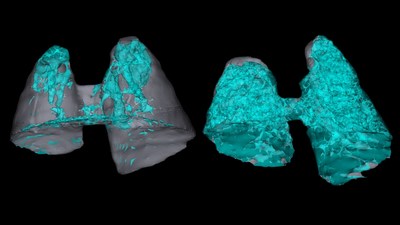Action required: Please refresh your browser
We have recently implemented some changes that require a hard refresh of your browser: Please hold down the CTRL-key and press the F5 key.
After a successful hard refresh, this message should not appear anymore.
More details about this topic are available here »
| Disarming the immune system's lethal lung response | ||
| By: PR Newswire Association LLC. - 23 Sep 2022 | Back to overview list |
|
|
COLD SPRING HARBOR, N.Y., Sept. 23, 2022 /PRNewswire/ -- Neutrophils, the most abundant type of white blood cell, are the body's first line of defense against infection. Foreign pathogens can stress the body and activate neutrophils. When activated, neutrophils employ various weapons to protect the body. But if overactivated, these weapons can damage the body's own tissues. Lung tissue is saturated with blood vessels, making them very susceptible to neutrophil attacks. If severe enough, acute lung injuries can lead to acute respiratory distress syndrome (ARDS), the leading cause of death due to COVID-19. Nicholas Tonks, Caryl Boies professor of cancer research at Cold Spring Harbor Laboratory (CSHL), and his team have found a drug candidate that can prevent lethal lung inflammation in mice by inhibiting a protein called PTP1B. Their discovery may help develop better treatments for severe inflammatory conditions like sepsis and COVID-19. "When you think about COVID-19, acute lung injury and ARDS underlie the fatal aspects of the disease," Tonks says. "And so, when the pandemic took hold, we were wondering whether there was anything we could do to help, to provide an understanding of this aspect of the disease and suggest ways it could be treated." Tonks' graduate student Dongyan Song investigated whether using a PTP1B inhibitor drug candidate could dampen the lethal consequences of overactive neutrophils in mice. She found less than half of untreated mice survived acute lung injuries and ARDS. But when pretreated with a PTP1B inhibitor, they all survived. The researchers exploited a natural process, called neutrophil aging, that the body uses to control the immune cell's lifespan. As they age, neutrophils become less dangerous. Tonks' team discovered PTP1B inhibition speeds up neutrophil aging. "An aged neutrophil is like a soldier without a weapon," Song explains. "So regardless of how many neutrophils flood an area, they won't be able to do serious damage." Tonks says collaborations with CSHL Professor Mikala Egeblad, postdoc Jose M. Adrover, and CSHL Research Associate Professor Scott Lyons were essential to this discovery. He hopes his lab's continued research leads to new treatments and preventative measures for various inflammatory diseases. Tonks is working with DepYmed, Inc. to take PTP1B inhibitor drug candidates into clinical trials. Tonks' lab studies signal transduction, the process that controls how cells respond to signals from their environment. In particular, they focus on the PTP protein family, which Tonks discovered over 30 years ago. Since then, he's sought to develop drug candidates that target these proteins, which can provide new approaches for treating major human diseases including cancer and metabolic and neurodegenerative diseases. About Cold Spring Harbor Laboratory Founded in 1890, Cold Spring Harbor Laboratory has shaped contemporary biomedical research and education with programs in cancer, neuroscience, plant biology and quantitative biology. Home to eight Nobel Prize winners, the private, not-for-profit Laboratory employs 1,000 people including 600 scientists, students and technicians. For more information, visit www.cshl.edu
SOURCE Cold Spring Harbor Laboratory 
|
||
|
||
 | Back to overview list | |




